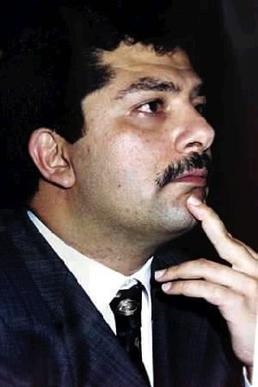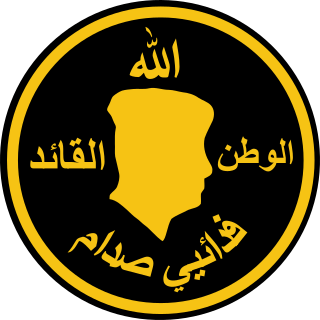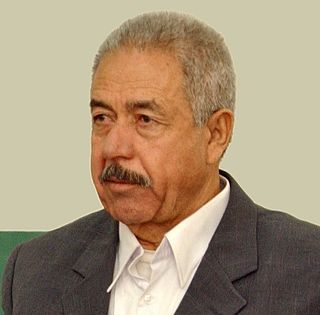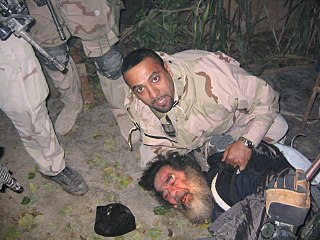
Qusay Saddam Hussein al-Nasiri al-Tikriti was an Iraqi politician, military leader, and the second son of Saddam Hussein. He was appointed as his father's heir apparent in 2000. He was also in charge of the Republican Guard, a branch of the Iraqi military. Qusay, his son Mustafa, and his brother Uday were killed in a U.S. raid in Mosul.

Saddam Hussein was an Iraqi politician and revolutionary who served as the fifth president of Iraq from 1979 to 2003. He also served as prime minister of Iraq from 1979 to 1991 and later from 1994 to 2003. He was a leading member of the revolutionary Arab Socialist Ba'ath Party and later its Iraqi regional branch. Ideologically, he espoused Ba'athism, a mix of Arab nationalism and Arab socialism, while the policies and political ideas he championed are collectively known as Saddamism.

Iraq under the Arab Socialist Ba'ath Party saw severe violations of human rights. Secret police, state terrorism, torture, mass murder, genocide, ethnic cleansing, rape, deportations, extrajudicial killings, forced disappearances, assassinations, chemical warfare, and the destruction of the Mesopotamian marshes were some of the methods Saddam Hussein and the country's Ba'athist government used to maintain control. Saddam committed crimes of aggression during the Iran–Iraq War and the Gulf War, which violated the Charter of the United Nations. The total number of deaths and disappearances related to repression during this period is unknown, but is estimated to be at least 250,000 to 290,000 according to Human Rights Watch, with the great majority of those occurring as a result of the Anfal genocide in 1988 and the suppression of the uprisings in Iraq in 1991. Human Rights Watch and Amnesty International issued regular reports of widespread imprisonment and torture.

Fedayeen Saddam was a paramilitary Fedayeen organization intensely loyal to the Ba'athist Iraqi government of Saddam Hussein. The name was chosen to mean "Saddam's Men of Sacrifice". At its height, the group had 30,000–40,000 members. The Fedayeen operated completely outside the law, above and outside political and legal structures.

Ali Hassan Majid al-Tikriti, nicknamed Chemical Ali, was an Iraqi military officer and politician under Saddam Hussein who served as defence minister, interior minister, and chief of the Iraqi Intelligence Service. He was also the governor of Kuwait during much of the 1990–91 Gulf War.

During the 2003 invasion of Iraq by a United States–led coalition, the U.S. Defense Intelligence Agency developed a set of playing cards to help troops identify the most-wanted members of President Saddam Hussein's government, mostly high-ranking members of the Iraqi Regional Branch of the Arab Socialist Ba'ath Party or members of the Revolutionary Command Council; among them were some of Hussein's family members. The cards were officially named the "personality identification playing cards". As of 2021, all but four of the 52 most wanted have either died or been captured, eleven of whom have been released.

Saddam Hussein, the deposed president of Iraq, was captured by the United States military in the town of Ad-Dawr, Iraq on 13 December 2003. Codenamed Operation Red Dawn, this military operation was named after the 1984 American film Red Dawn.

Lieutenant General Abid Al-Hamid Mahmud al-Tikriti was an Iraqi military officer and Saddam Hussein's personal secretary.

The Committee for Peace and Security in the Gulf (CPSG), formed in 1990 to support president George H. W. Bush’s campaign to drive Saddam Hussein out of Kuwait, was a bipartisan group whose members were active in U.S. foreign-policy circles. “The 39-member group…[included] former U.S. Rep. Stephen Solarz of New York, who was a member of the House Foreign Affairs Committee and Richard Perle, a former assistant defense secretary for international security policy.”

James B. Hickey is a retired U.S. Army colonel. In December 2003, he led Operation Red Dawn, the U.S. military effort that captured Saddam Hussein near Tikrit, Iraq.

Eason Jordan is an executive and entrepreneur who serves as the Rockefeller Foundation's Senior Vice President for Connected Leaders.

Kevin Sites is an American author and freelancer journalist. He has spent nearly a decade covering news for global wars and disasters for ABC, NBC, CNN, and Yahoo! News. Dubbed by the trade press as the "granddaddy" of backpack journalists, Sites helped blaze the trail for intrepid reporters who work alone, carrying only a backpack of portable digital devices to shoot, write, edit, and transmit multimedia reports from the world's most dangerous places. His first book, In the Hot Zone: One Man, One Year, Twenty Wars, shares his effort to put a human face on global conflict by reporting from every major war zone in one year.

Cal Perry is a former broadcast journalist who most recently worked for MSNBC. He previously worked at Voice of America in a senior role and briefly at Al Jazeera English. Before joining Al Jazeera, he worked for many years with CNN, mostly in the Middle East. During this time, he served as: Bureau Chief in Baghdad, Iraq (2005-2007), Bureau Chief in Beirut, Lebanon. From these bases, he also covered the wars in Lebanon (2006), Georgia (2008) and Pakistan (2008), plus the aftermath of the devastating cyclone in Bangladesh, in 2007. In 2022, he joined the Baltimore Orioles as senior vice president and chief content officer.
Ash-har Quraishi is an American broadcast journalist and national consumer correspondent for CBS News. He is a former reporter for WMAQ-TV in Chicago. He was previously the chief Midwest correspondent for now-defunct Al Jazeera America at its Chicago Bureau. He has served as CNN's bureau chief in Islamabad. He later worked for WTTW-TV in Chicago and for the Chicago News Cooperative. He was born in Chicago.
Larry Johnson is an American author and former employee of the Alcor Life Extension Foundation (Alcor), a cryonics company for whom he once served as a paramedic. He received notoriety with the release of the August 13, 2003 issue of Sports Illustrated. Sports Illustrated sportswriter Tom Verducci, along with Johnson's input, published an article about “What Really Happened to Ted Williams?" Immediately following the Sports Illustrated article, Johnson agreed to an interview with Diane Sawyer of Good Morning America.
Kenneth Joel Baker is an American entertainment journalist and author who is the senior correspondent for E! News as well as the host of E! Online's daily web show Live From E!.

Clarissa Ward is a British-American television journalist who is the chief international correspondent for CNN. Previously, she was with CBS News, based in London. Before her CBS News position, Ward was a Moscow-based news correspondent for ABC News programs.
Mark Stone is a British journalist who is currently US correspondent for Sky News. He was previously the network's Europe Correspondent (2015–19), Asia Correspondent (2012–15) and Middle East correspondent.
Robyn Curnow is a South African journalist, broadcaster, and author. She was an anchor and foreign correspondent for CNN International and CNN USA.
Eric Maddox is an American public speaker, author and former special operations soldier. He was attached to a Task Force Special Operations team in Tikrit that was part of the Joint Special Operations Command responsible for tracking down the most wanted men in Iraq. During his six month tour with this Task Force team, Eric conducted over 300 interrogations and collected intelligence which directly led to the capture of Saddam Hussein.













